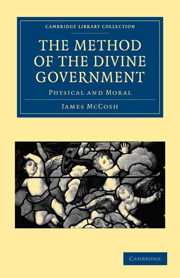Book contents
- Frontmatter
- Contents
- PREFACE TO FIRST EDITION
- PREFACE TO SECOND EDITION
- BOOK FIRST GENERAL VIEW OF THE DIVINE GOVERNMENT AS FITTED TO THROW LIGHT ON THE CHARACTER OF GOD
- BOOK SECOND PARTICULAR INQUIRY INTO THE METHOD OF THE DIVINE GOVERNMENT IN THE PHYSICAL WORLD
- BOOK THIRD PARTICULAR INQUIRY INTO THE PRINCIPLES OF THE HUMAN MIND THROUGH WHICH GOD GOVERNS MANKIND
- CHAPTER I MAN's ORIGINAL AND INDESTRUCTIBLE MORAL NATURE
- CHAPTER II ACTUAL MORAL STATE OF MAN
- CHAPTER III OTHER GOVERNING PRINCIPLES OF THE HUMAN MIND
- BOOK FOURTH RESULTS—THE RECONCILIATION OF GOD AND MAN
- APPENDIX ON FUNDAMENTAL PRINCIPLES
- REFERENCES TO AUTHORS AND SYSTEMS
CHAPTER III - OTHER GOVERNING PRINCIPLES OF THE HUMAN MIND
Published online by Cambridge University Press: 29 August 2010
- Frontmatter
- Contents
- PREFACE TO FIRST EDITION
- PREFACE TO SECOND EDITION
- BOOK FIRST GENERAL VIEW OF THE DIVINE GOVERNMENT AS FITTED TO THROW LIGHT ON THE CHARACTER OF GOD
- BOOK SECOND PARTICULAR INQUIRY INTO THE METHOD OF THE DIVINE GOVERNMENT IN THE PHYSICAL WORLD
- BOOK THIRD PARTICULAR INQUIRY INTO THE PRINCIPLES OF THE HUMAN MIND THROUGH WHICH GOD GOVERNS MANKIND
- CHAPTER I MAN's ORIGINAL AND INDESTRUCTIBLE MORAL NATURE
- CHAPTER II ACTUAL MORAL STATE OF MAN
- CHAPTER III OTHER GOVERNING PRINCIPLES OF THE HUMAN MIND
- BOOK FOURTH RESULTS—THE RECONCILIATION OF GOD AND MAN
- APPENDIX ON FUNDAMENTAL PRINCIPLES
- REFERENCES TO AUTHORS AND SYSTEMS
Summary
SECT. I.—GOVERNING PRINCIPLES NEITHER VIRTUOUS NOR VICIOUS.THE APPETITES AND INSTINCTIVE PRINCIPLES OF ACTION.
There are certain governing principles planted in the human mind by God, the exercise of which is neither virtuous nor vicious. Now, it is a circumstance worthy of being noticed, that all of these are excellent in themselves, and in admirable adjustment to the state in which the author of our being has placed us. Anterior to the abuse which may be made of them, they are of the most beneficent nature, and eminently fitted to promote the welfare of the individual, and of society at large. The mere possession of these principles, however, does not constitute any one virtuous. It proves merely the wisdom and benevolence of Him who hath planted them in our natures. The virtue or vice of mankind lies in the use made of these principles. So far as we establish their beneficence, we establish not the moral excellence of man, but the benevolence of God.
In now proceeding to consider some of these principles of action, we will not be at pains to make a very nice or subtle analysis of them. It is possible that a refined analysis might resolve some of those about to be enunciated into simpler principles : we look at them in the obvious forms which they assume in the ordinary operations of the mind. It is of little consequence to the object in view, whether they be original principles, or the natural and necessary result of such original principles.
- Type
- Chapter
- Information
- The Method of the Divine GovernmentPhysical and Moral, pp. 416 - 448Publisher: Cambridge University PressPrint publication year: 2009First published in: 1850



